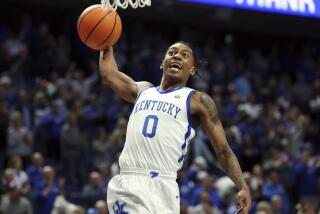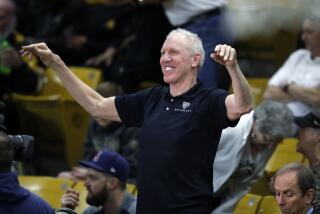Leaving Champions Was the Right Move : College basketball: McCaffrey, The Guy Who Left Duke, says it was what he had to do.
- Share via
NASHVILLE, Tenn. — Nobody understands. Probably nobody ever will. Not the TV guys who said right away that Bill McCaffrey left Duke because he wanted someday to play point guard in the NBA.
Not the writers who said he wanted more playing time, pure and simple. Not the people who will stop him, even now, as he walks across the Vanderbilt campus, and ask him: Didn’t you miss playing on a national championship team?
Like it or not -- and he doesn’t, by the way -- McCaffrey is The Guy Who Left Duke. And in the often murky realm of college sport, academics and all-around honor among youth, Duke is perceived as Olympus. It is where basketball players go to play in Final Fours every year, graduate and take away some small slice of a tradition that is clean and positive beyond logic. People don’t leave Duke, people dream about going there.
Not that McCaffrey missed the experience. When we last saw him in a wide, public light, he was a 6-foot-4 sophomore guard, standing in the middle of a densely packed locker room in the bowels of the Hoosier Dome after scoring 16 points off the bench in Duke’s 72-65 victory over Kansas in the 1991 NCAA championship game. He was the difference that night, the star.
“The banner that’s hanging here, from that season, has a piece of Billy in it,” Duke Coach Mike Krzyzewski said last week. “He was very much a key. I hope he identifies with it.”
But even as McCaffrey addressed wave upon wave of questioners that night in Indianapolis, he had pointed himself toward leaving Duke. It would be the most difficult decision of his life, more difficult than choosing Duke (or any other college) after high school, because there would be no parents or coaches or slick recruiters to blame.
Sixteen days after the championship game, McCaffrey announced he was transferring. One month after that, he chose Vanderbilt. The response was universally incredulous.
“He had to put up with a lot of crap,” said McCaffrey’s older brother, Ed, a second-year wide receiver with the New York Giants who went to Stanford. “There were so many negative things said about Bill, and he’s too solid a kid to say this, but people judged him because of the decision he made.”
It is nearly two years later, and Bill McCaffrey is eligible again, after sitting out the requisite year required by the NCAA for transfers. He is starting at -- yup -- point guard for Vanderbilt, although he plays both guard positions, and is averaging 19.4 points for the 6-1 Commodores.
But the Duke experience, and the experience of leaving, have left a clear imprint on McCaffrey. Unobtrusive by nature, he is guarded and fearful of discussing the Duke chapter of his life. Even back then, the scope of what seemed a visceral decision surprised him. “It’s amazing, once you get into the decision-making, how many people it affects,” McCaffrey said.
But why? Why leave Oz for Nashville?
“I understand why people ask,” McCaffrey said. “What I really sought and what I really wanted was consistency. I think a player likes to know that he can be counted on for certain things, every night. That’s how I get pleasure from the games. The big reason for me leaving was to enjoy the games more, even if that meant losing more of them.”
McCaffrey roomed with Bobby Hurley for two years, and they still are close friends. “He explained it to me after that season,” Hurley said. “He felt that he wanted to get out on his own a little bit more, out of the shadow of guys like me, Christian (Laettner) and Grant (Hill), guys that really command a lot of the spotlight. And I’m sure part of him wanted to handle the basketball more.”
Understand that McCaffrey did play. A lot. In his sophomore year, he averaged 24.8 minutes a game, third behind Hurley and Laettner. But typical of his year was the Final Four: 14 minutes against Nevada Las Vegas in the semifinals, 23 against Kansas in the final. “Playing a key factor in some games, very minimal in others,” McCaffrey said. “My role probably would have been the same if I had stayed. I felt I could do more. I needed more security ... to enjoy the game more.”
It is something of a flip side at Duke: so much talent, so few minutes. A writer suggested to McCaffrey that for all anybody knew, Antonio Lang, Duke’s fifth-best starter this year, might be a great player -- “He is, by the way,” McCaffrey said -- except he is hidden among the likes of Grant and Thomas Hill and Cherokee Parks. Crawford Palmer, a 6-8 forward who averaged 10 minutes a game in 1990-91, also transferred, to Dartmouth.
“Kids want to play,” Vanderbilt Coach Eddie Fogler said. “Transfers are becoming more prevalent all over the country.” They seek freedom, and the system allows them little. McCaffrey had to sit out an entire year.
Krzyzewski said, “Billy could have played in our program. He play in our program. He felt that a more prominent role in another program would be better for him, and nobody should attach some stigma to him for that.” In 1991, Krzyzewski was weighing an offer from the Boston Celtics. “How could I tell him he couldn’t leave if I was thinking about it?”
The NBA remains a distant dream. “He would have had a chance to play in the NBA if he stayed here,” Hurley said. “Look at all the exposure we get.” Hurley surmised that a player from another school with the same talent as Duke’s 6-7 Brian Davis probably would not have been drafted last spring in the second round, as Davis was. “I’d like to play in the NBA, but that’s not why I transferred,” said McCaffrey, an economics major who expects to earn his degree by May.
Maybe the NBA really doesn’t matter. Maybe comfort and pleasure, both of which McCaffrey has found at Vanderbilt, are enough. Freedom, too, a rare commodity for college athletes. He no longer is one of many good players, he is the best player.
“I don’t regret leaving Duke,” McCaffrey said. “I cherish those memories. The regret would have been if I finished out there and asked myself, ‘What if I had left, I wonder how it would have been?’ I think that’s hard for people to understand.”
It is. And it shouldn’t be.
More to Read
Go beyond the scoreboard
Get the latest on L.A.'s teams in the daily Sports Report newsletter.
You may occasionally receive promotional content from the Los Angeles Times.










